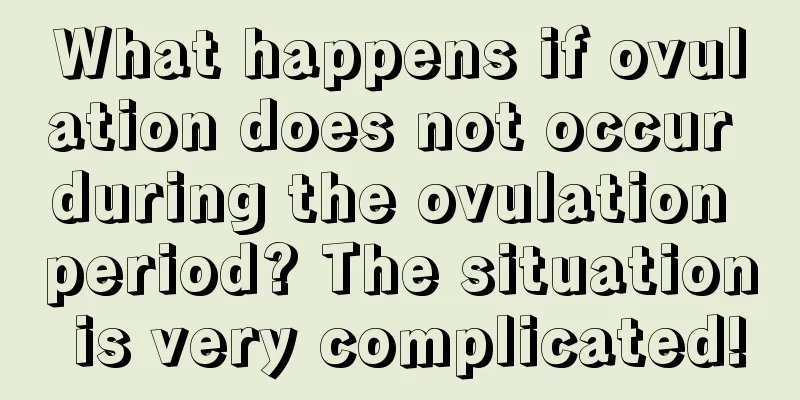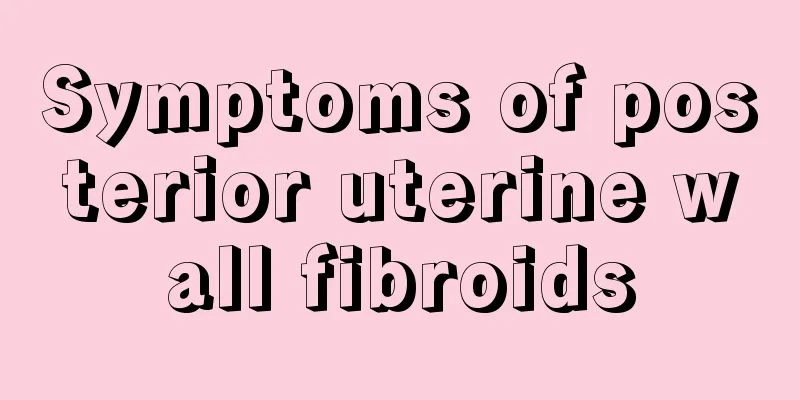What happens if ovulation does not occur during the ovulation period? The situation is very complicated!

|
Under normal circumstances, ovulation will occur when the ovulation period arrives, but this is not necessarily the case. Some people do not ovulate during the ovulation period. There are many reasons for this, such as psychological factors, gynecological diseases, or ovarian problems. 1. Central endocrine disorders. When the central endocrine system is disordered, the peak secretion level of luteinizing hormone (LH) is insufficient to stimulate the biochemical and histological changes that lead to the digestion and rupture of the follicle wall, thereby affecting the growth and development of the follicle and the occurrence of ovulation. 2. Gynecological diseases. Take pelvic inflammatory disease as an example. When the fallopian tubes become inflamed, they will thicken, become fibrotic and become cord-like, and may even adhere to the ovaries, uterus and surrounding organs and tissues, forming a hard and fixed mass. In severe cases, it will hinder ovulation from the ovaries. 3. Enzyme deficiency or prostaglandin deficiency. Fibrinolytic enzyme, activated collagenase, and prostaglandins act on the basement membrane of the follicle wall, digesting the follicle wall and leading to the formation of the ovarian ovulation pore. If there is a lack of enzymes or prostaglandins at this time, it will greatly affect the discharge of eggs. 4. Hyperprolactinemia. Prolactin affects the normal secretion of gonadotropin from the pituitary gland, thereby causing ovarian dysfunction and affecting the normal development of follicles and the ovulation function of the ovaries. 5. Mental and psychological factors. If you are in a state of stress such as tension, anxiety, panic, etc. for a long time, it can cause repeated small peaks in the blood prolactin level and affect ovulation. This situation is often accompanied by symptoms such as irregular menstruation, dysmenorrhea, and breast pain. 6. Medication: Taking certain medications, such as long-acting steroid injections, disrupt the interaction between the brain and the ovaries, suppressing ovulation and thus preventing pregnancy. There is some evidence that the longer this method of contraception is used, the greater the likelihood of developing amenorrhea. 7. Ovarian diseases: including congenital ovarian dysgenesis, polycystic ovary syndrome, premature ovarian failure, ovarian tumors, etc. 8. Follicular hypoplasia. Poor follicular development can lead to anovulation. Blockage of the fallopian tubes can also cause the egg to be released. |
<<: Labia majora atrophy, do you know what this is?
>>: What should I do if my ovulation period is abnormal? These methods deal with
Recommend
What should I do if drinking during menstruation causes amenorrhea?
Women who are menstruating will become very weak ...
[Medical Q&A] Can birth defects be detected during pregnancy?
Author: Zhao Quming, deputy chief physician, Chil...
Can the gynecological capsule treat abnormal leucorrhea?
Normal leucorrhea is a white, translucent, egg wh...
Lost ten pounds during pregnancy?
Everyone knows that pregnancy is a special physio...
What are the symptoms of myometritis?
Women are very likely to suffer from gynecologica...
Major changes in breasts during menstruation
I have been menstruating for 2 years, but there i...
What causes yellow leucorrhea to occur frequently?
Almost every woman will be troubled by gynecologi...
Will urine protein be high during menstruation?
Women will have many different behaviors during m...
Will Qi stagnation and blood stasis affect pregnancy?
When the various organs of a woman's body are...
What are the chances of getting pregnant during menstruation?
Many people are worried about whether they will g...
Brown discharge after IUD insertion, what causes it?
IUD insertion is a means of long-term contracepti...
What should I eat when my menstrual flow is light? 7 recipes recommended by nutrition experts
When the menstrual flow is too little, it means t...
Can vulvar leukoplakia be cured?
Vulvar leukoplakia is a disease that women are pr...
Can I detect pregnancy after 2 days of amenorrhea?
Unplanned pregnancy is a problem that many women ...
Dreaming about cutting your fingernails
Dreaming about trimming your nails indicates that...









